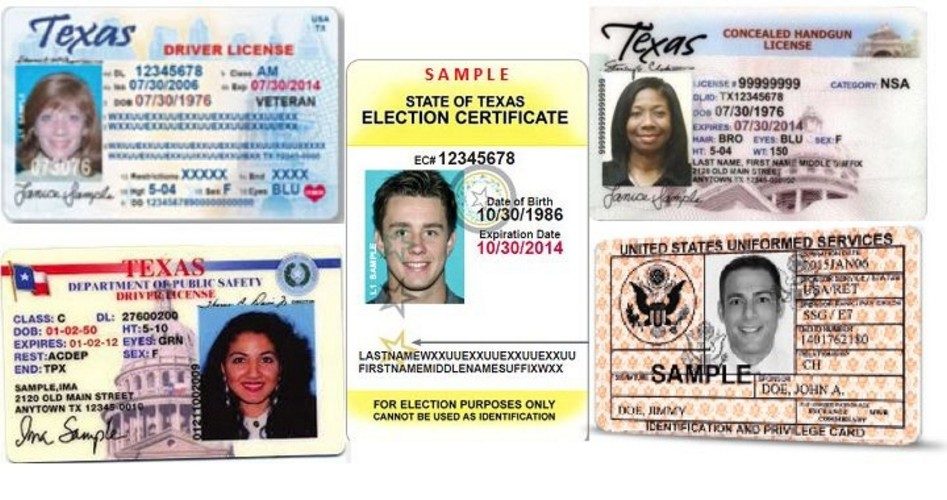
On Wednesday, a federal appeals court ruled that Texas’ voter ID law discriminates against minority voters and ordered changes to be made before the upcoming election.
A 15-judge panel on the 5th U.S. Circuit Court of Appeals determined that the Texas Voter ID law violates the Voting Rights Act and has instructed a lower court to make changes to the law to correct its “discriminatory effect” in time for the November general election.
In the 9-6 ruling, the court wrote, “We acknowledge the charged nature of accusations of racism, particularly against a legislative body, but we must also face the sad truth that racism continues to exist in our modern American society despite years of laws designed to eradicate it.”
This drew criticism from the dissenting judges.
In the dissent, Judge Edith Jones accused the majority of fanning “the flames of perniciously irresponsible racial name-calling.” She went on to compare the majority to “Area 51 alien enthusiasts who, lacking any real evidence, espied a vast but clandestine government conspiracy to conceal the truth.”
Texas’ 2011 Voter ID law asks Texas residents to show one of seven forms of identification — a driver’s license, military ID, passport, weapon’s permit, etc. — in order to vote in an effort to combat voter fraud. Citizens who do not have one of the qualifying IDs can obtain “election identification certificates” for free after they present a copy of their birth certificate.
“Preventing voter fraud is essential to accurately reflecting the will of Texas voters during elections, and it is unfortunate that this common-sense law, providing protections against fraud, was not upheld in its entirety,” Texas Attorney General Ken Paxton, a Republican, said in a statement.
The dissenting judges agreed with this assessment, noting that “requiring a voter to verify her identity with a photo ID at the polling place is a reasonable requirement widely supported by Texans of all races and members of the public belonging to both political parties.”
Despite frequent claims by the Left, voter fraud is a very real concern, particularly in Texas.
In a 2012 op-ed piece written by then-Texas attorney general Greg Abbott, he noted that his office had secured more than 50 voter fraud convictions “in recent years.”
And the problem is not just a local one.
In a 2013 survey by pollster John McLaughlin of over 800 Hispanic registered voters, 13 percent admitted they were not citizens of the United States.
A 2014 study based on survey data from the Cooperative Congressional Election study estimated that 6.4 percent of noncitizens voted illegally in the 2008 presidential election, and 2.2 percent voted in the 2010 midterm elections.
In 2008, the U.S. Supreme Court recognized the threat of voter fraud and upheld Indiana’s photo ID requirement as a legitimate, non-discriminatory means to prevent voter fraud.
The Washinton Examiner illustrated the ludicrousness of claims and rulings saying that getting an ID is too large a burden for voters by listing 24 things that require an ID: alcohol, cigarettes, opening a bank account, applying for food stamps, applying for welfare, applying for Medicaid/Social Security, applying for unemployment or a job, buying a house or applying for a mortgage, driving/buying/renting a car, getting on an airplane, getting married, purchasing a gun, adopting a pet, renting a hotel room, applying for a hunting license, applying for a fishing license, buying a cellphone, going to a casino, picking up a prescription, holding a rally or protest, giving blood, buying an “M” rated video game, purchasing nail polish at CVS, and purchasing certain cold medicines. Note that many of these prohibitions are imposed by state governments, but some are also imposed by the very federal government that is stopping ID use in elections.
But this has not stopped the Obama administration from targeting voter ID laws as racially discriminatory, claiming they create an unfair burden for low-income, black and Latino voters.
Proponents of the Texas law contend that the state makes it easy for residents to obtain free IDs, and therefore the law does not place a substantial burden on any Texan interested in voting.
Opponents countered that the law presents several bureaucratic and economic burdens, such as having to obtain a birth certificate in order to obtain an ID. Additionally, the American Civil Liberties Union filed a brief in which it outlined testimony from other voter ID states that cited various examples of expenses and travel required in order for residents to obtain IDs.
Critics of the law are celebrating Wednesday’s ruling. The Texas Democratic Party released a statement indicating “the most restrictive and discriminatory Republican voter ID law in country has been struck down.”
And the legal team that challenged the law said they were “extremely pleased” with the ruling. “This law will no longer prevent eligible voters from casting a ballot this November,” said attorney Gerry Herbert of the legal team.
Similar challenges against voter ID laws are taking place throughout the country.
Reuters notes that a federal judge in Wisconsin softened the state’s voter ID law on Tuesday by stating that residents without a photo ID should be permitted to vote in November as long as they sign an affidavit explaining that they could not get identification.
North Carolina’s voter ID law, which had been upheld by a district court judge in April, is expected to receive a ruling from a federal appeals court shortly.
Experts believe that the legal battle over the Texas Voter ID law will likely be settled by the U.S. Supreme Court once a ninth justice is installed. A split 4-4 ruling at the Supreme Court would simply default to the lower court’s ruling.




